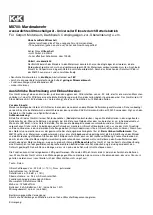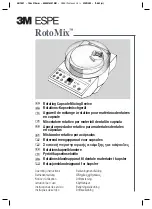
- 20 -
RA_MA_DI_COMBIBIRD_CB_1510_EN
- 11/15
O
peratOr
'
s
manual
COmBIBIrD CB
fOlDIng
semI
-
mOunteD
versIOn
5 h
ITchIng
and
unhITchIng
5.1 Hitching the implement to the tractor
a
CAUTION:
Make sure that hitching the implement does not
result in:
- Overloading:
Observe the maximum permissible load at the
hitching points.
- Poor distribution of loads:
Ballast the tractor at the front (see 4.3).
5.1.1
Tractor equipped with link arms with fixed
ball joints
i
IMPORTANT:
Ensure that the ball joint diameters (tractor-side) and
the implement pins are compatible.
-
Remove the implement hitching pins by first removing the
safety pins.
-
Back up the tractor and align the ball joints on the lower link
arms and the corresponding holes on the implement side.
-
Insert the pins and lock them with the safety pins.
-
If the holes are difficult to align: release the telescopic arms
(see tractor operator's manual), once the pins are correctly
positioned and locked, back up the tractor until the telescopic
arms return to their correct position and relock themselves.
Check that the mechanism has re-engaged.
5.1.2
Tractor equipped with link arms with
removable ball joints
-
Remove the hitching pins by taking out the safety pins.
-
Take out the removable ball joints of the quick-action hitching
jaws of the tractor's lower link arms.
-
Check the correspondence between the diameters of the ball
joints and of the pins.
-
Place the ball joints on the pins. Put the pins back onto the
implement, not forgetting the safety pins.
-
Back up the tractor until the quick-action hitching jaws of the
lower link arms are under the pins (with the ball joints fitted) of
the implement.
-
Raise the lifting mechanism until the jaws fit around the ball
joints.
-
Raise the implement about 5 cm above the ground and check
the positioning of the ball joint locking mechanism in the jaws.
a
CAUTION:
Make sure the space between the implement yoke
and the lower arms of the tractor is sufficient, so
that there is no possibility of contact from the raised
position to the working position. A second check
must be performed in the field, when the implement
is under actual working conditions.
5.1.3
Electrical connection of the signalling
equipment
1
Legend
1 Tractor power socket
1
2
3
4
5
6
7
Legend
1 Left-hand direction indicator (yellow)
2 Free
3 Ground (white)
4 Right-hand direction indicator (green)
5 Right-hand tail light (brown)
6 Stop light (red)
7 Left-hand tail light (black)
∙
Connect the lighting cable to the tractor power socket.
5.1.4
Hydraulic and Pneumatic connections
∙
See Chap. 7
Summary of Contents for COMBIBIRD CB
Page 2: ......
















































